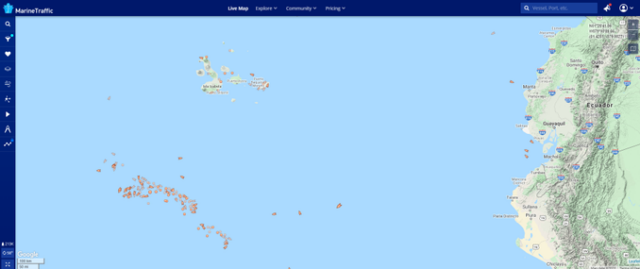NEW DELHI: A flotilla of 260 Chinese fishing boats seen near the eco-sensitive Galapagos Islands off Ecuador recently raised diplomatic tensions. It brought the focus back on UNCLOS (United Nations Conventions on the Laws of the Sea) that has a direct bearing on more than 4 billion people residing within 400 km of a sea coast.
The 1960s witnessed a stark rise in exploitation of marine reserves. Although UNCLOS was introduced in 1956, it took nearly four decades for deliberations and refinement before it was accepted in 1994. Today 167 countries and the EU have ratified it. China too has done that.
Apart from territorial seas (12 nautical miles) and contiguous zones (24 nautical miles) that enable sovereignty, every coastal state’s Exclusive Economic Zone (EEZ) ensures its sole exploitation rights over all natural resources. Developing or underdeveloped nations make up the majority of coastal states dependent on EEZs for sustenance. In some cases, where a coastal state is unable to exploit the resources themselves, they license such activities to other nations for a fee. The procedure serves two purposes. While the coastal state economically benefits from its geography, it retains control to prevent over-exploitation of resources, thereby maintaining the ecological balance.
Enter the ‘Wolf of the Seas’. China has followed a two-pronged approach towards UNCLOS. Within southeast Asia and the South China Sea, it illegally claims large tracts of as its own and quotes UNCLOS to defend its territorial and EEZ rights. On the other hand, it regularly argues how skewed the concepts of EEZ and UNCLOS are in terms of unequal distribution of resources. Flawed arguments such as how New Zealand, with a population of approximately five million has an EEZ of 4.1 million sq km while China, with a population of 1.3 billion, has approximately 900,000 sq km, frequently do the rounds.
The South China Sea Arbitration brought by the Philippines against China under Annex VII to the UNCLOS concerning the legality of China’s Nine-Dash Line is the most recent and well-known example. Yet, it is the illegal exploitation of resources in the EEZ that has largely remained in the shadows when it comes to UNCLOS and China.
Here again, the bulk of coverage regarding oceans and their resources is focussed on oil, natural gas and minerals. What largely remains under the radar is illegal unreported and unregulated fishing or IUUF. China accounts for about 35 per cent of global demand for fish. The largest consumer of fish in the world, the stock in its waters has depleted, thanks to overfishing. If it were only to feed its population, perhaps a little empathy may have been justified. But when it is profit-driven, any semblance of empathy turns into repugnance.
Following President Xi Jinping’s directives to “build bigger ships and venture even farther into the oceans and catch bigger fish”, the CCP has encroached on every possible EEZ where the coastal state is unable to repulse illegal fishing on account of ill-equipped coast guard or navy. The CCP’s deep-water fleet with an estimated 3,500 deep-water hulls has become a key vendor of fish sold to Europe, Asia, the Americas and other parts of the world.
The Galapagos incident was not a one-off incident. China has deceitfully married its Belt and Road Initiative (BRI) to illegal and unregulated fishing. Where possible, the Chinese economic heft has simply gobbled up local fishing. In Nouadhibou, a Mauritanian port, a Chinese company invested over US $100 million to usurp the port under the pretext of BRI. The traditional fishing fleets have been rendered inconsequential and a full-fledged facility centre has been set up ashore to process the Chinese catch off West Africa. In particular, stocks of Sardinella (a type of fish) have witnessed a stark decline, not just off Mauritania but off Gambia and Senegal too. The result has been damage to indigenous livelihoods and their access to food while disrupting the ecological balance. An estimated 7 million jobs has been affected due to Chinese fishing off the west coast of Africa alone.
Africa might appear to be easy picking to the uninitiated when it comes to Chinese IUUF. Since 2016, many South American coastal states such as Peru, Argentina, Chile and Uruguay have had to undertake combined measures to physically attack and destroy these boats because CCP would not rein them in. Even states with proper maritime agencies have not been spared. Australia and South Korean governments have termed Chinese fishing as a security threat since 2017. Indonesia has publicly destroyed seized Chinese fishing boats under media coverage. CCP though seems to bash on. In June last year, 10 Chinese fishing boats that sought shelter at the Indian coastal town of Ratnagiri, citing Cyclone Vayu were discovered to have been indulging in IUUF.
China is, undoubtedly, the single largest decimator of oceans and their natural resources. None it seems is spared of Chinese IUUF and its scant regard for provisions of UNCLOS that assures the coastal state exclusive rights to resources within the EEZ. The wolf of the oceans that steals livestock, livelihoods and economies while rampantly decimating ecological balances across the globe needs to be held accountable. Beijing’s gluttonous actions if not called out and thwarted shall adversely impact the planet. Having trampled upon Laws of the Sea systematically and shamelessly, China now wants a seat at the ITLOS (International Tribunal for the Law of the Sea)!





